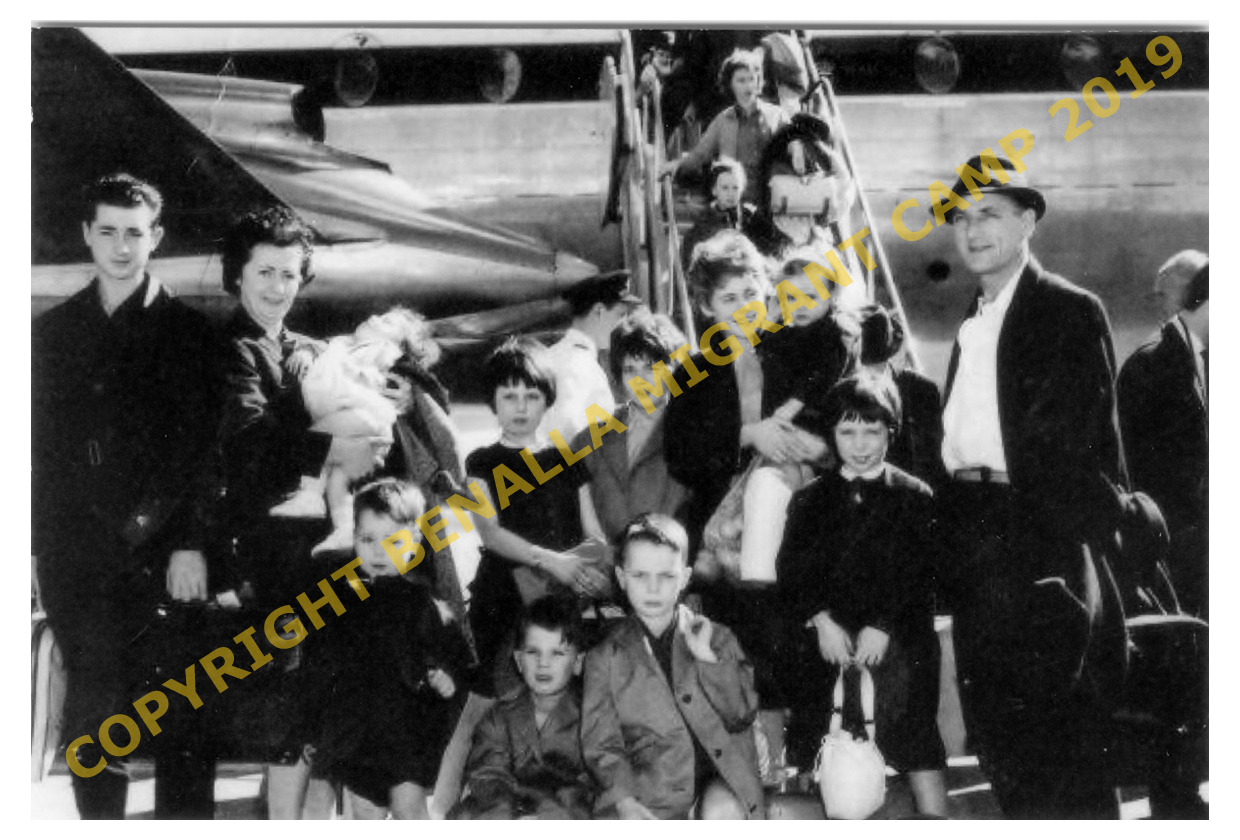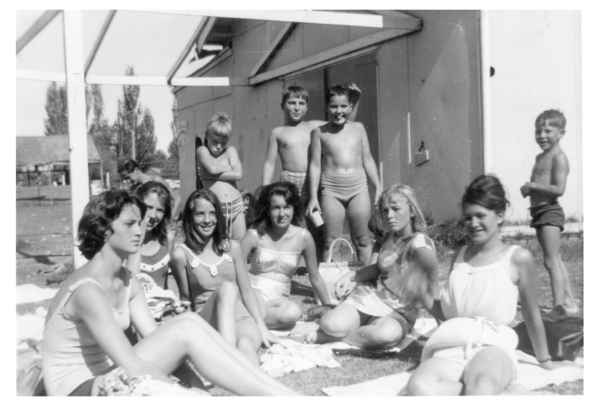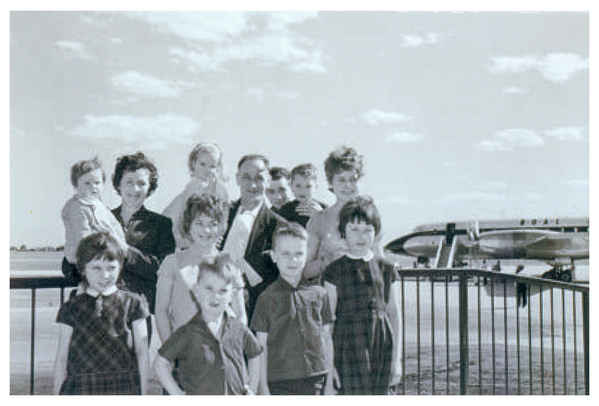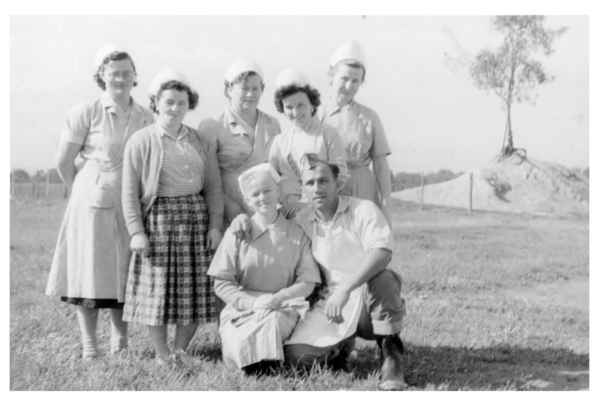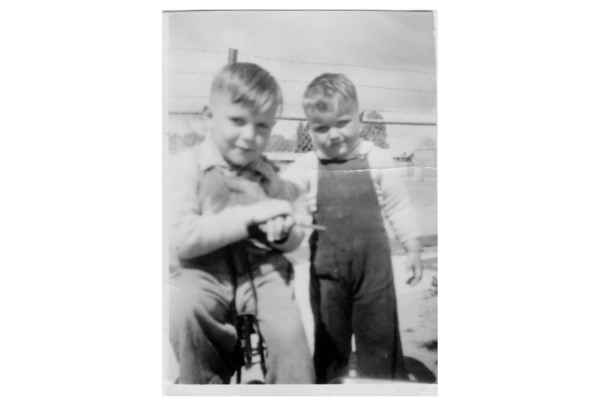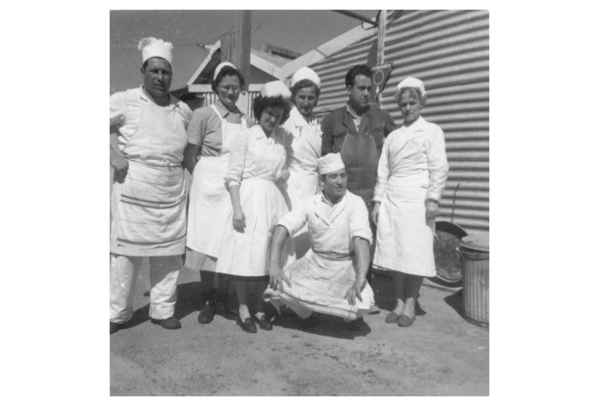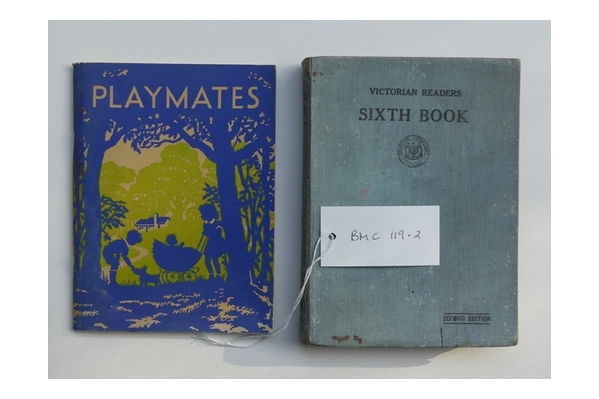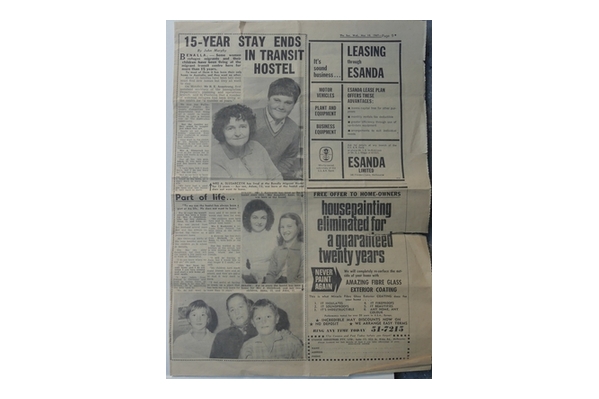SLUSARCZYK Antonina (Tosia)
Poland 1952-1967
MY MEMORIES OF LIFE IN THE BENALLA CAMP
The Beginning
(This story was edited and permission was only granted to use it on 13/11/2019 via email.)
Introduction:
My name is Irena Slusarczyk and this is my recollection of my life in Benalla MAC.
My mother Tosia (Antonina) was a single unmarried mother, 23 years old at the time and I was 3 year old when we left the camp in Neustadt, Germany when we started our journey to Australia. I was born in Lubeck, Germany. Mother was deported to Germany for forced labour in 1942.
Mother was advised by her father, against repatriation to Poland; her father was a mason living nearby Krakow with his family and her brother Franek, was a mason like his father, was living in Scotland and then moved on to Manchester, UK. Her brother lives in Wales , U.K. today with his wife and son.
We were approved to board on the ship Skaugum 111, ex Naples on 2nd March 1950 having been cleared to proceed . Mother and I had medical checks, were kept longer in Naples for some weeks until I recovered from chicken pox; mother was passed as ‘fit for work’ in Australia.
On 28th March 1950 we had arrived in Sydney and were transferred to Bonegilla camp and then transferred to a farm in Bowning, NSW; mother was allocated for domestic work for a farmer’s wife. We were there for a short time, have little memory of this.
On the 26.12.50 we returned to Bonegilla; transferred to Immigration Holding Centre Uranquity on 26.1.51 then transferred back to Bonegilla on 13.10.51 after H.C. Uranquity was closed down. We again, were transferred to the Bonegilla camp, my brother Robert was born in Albury Hospital. Finally on the 30.4.52 we were transferred to the Holding Centre in Benalla - we had arrived to stay for the duration until the camp was closed in November 1967. A sad and worrying time for many who had to leave their sanctuary.
Camp Life:
We had a choice of friends and there was so many of us; we run wild on the camp grounds, quite safe, secure and protected; all of the mothers around corrected our behaviour and directed us as was required.
It was a great life for most of the children, we had so much freedom and some of our mothers gave us more freedom and held very loose leashes on their children.
I was one of the lucky independent, noisy, active camp kids. The people we grew up with, our life experiences in the camp, has made us who we are today. Certainly, I do not regret the way I grew up in our Spartan accommodation, our poverty, lack of resources available for adults or the children. We grew a strong back-bone and learnt how to cope with almost everything in life – we had strong mothers as a prime example for us! We had to be seen as tough, not to take abuse/harassment and learnt to defend and look after ourselves. It had to be done this way. After all, life was tough and a struggle.
Aerodrome School.
I enrolled myself as a pupil in the school. My mother sent me to do so, having so little English herself, I had to fend for myself.
School was fun; our teachers were great and kind and understanding with us; encouraged us to keep up with school work and involved us with sport – wonderful fun, pushed ourselves as far as we could. A lot of the children were talented with sports but there was so little training available locally. We did well with athletics/soccer/swimming – anything we could get involved in. We watched documentaries often in school; to this day I enjoy them watch them on the television.
A summer day, 3rd class room in our school hut, situated between the camp church and the child-care/crèche building; our teacher Mr Spry with a calm, firm voice told all of the children to very quietly sit on top of our desks, not to look behind and do not move. Mr Spry quietly and silently reached for a perhaps a baseball or cricket bat, killed a very large snake had crawled through the open door. Any opportunity we could take absenting ourselves to go to the toilet or at recession/lunch break, we lift the lid of the garbage to ensure the snake was indeed dead.
High School:
It was not easy in this school; for the first time in our lives we had to study and do home-work and that cramped our after-school activities and play time available for ourselves and our friends.
The first week of high school was a shocker; we were surprised to encounter a “welcoming group” of fellow-students, the town girls who would not allow us through the gate. The boys were not involved at all on either side but for the first week, it was on, a fist fight between the girls every morning. They told us to get-out of their school.
In our class, the camp boys looked out for us; if we lacked or forgot something, the camp boys walked around our class room and selected the missing item and was given to us for our use. We did return our piffled rulers/pencils/text book etc to the student.
It was not acceptable if they heard us speaking in our native language in their presence – we often did it deliberately to give them the pips! We didn’t care.
During one of one our ‘domestic-science’ class, one of a few of our young teachers to stay after the class and had a talk with us, showed us much understanding, compassion and explained why the local girls disliked us so much and how to deal with this issue. We felt so comforted and supported from two wonderful teachers; this helped us how to cope.
Earning money:
Mother was employed in the camp kitchen; we were moved to the staff barracks – they were supposedly better accommodation but, it was not at all. I do not recall owning a key to our rooms – after all, we had nothing of value to steal.
My mother relied on me to help out with my younger brothers; I washed and dressed them, prepared their breakfast and took them to the crèche for care, picking up my brothers after school, looked after them, entertaining them with a game or read some books until mum finished her shift at the camp kitchen. Often I took my brothers for a bath in the camp facility, preparing them for bed, reading stories.
When the boys were old enough to join in play with their peers with some supervision from myself and help from available mothers, who kept an eye on us. It was a good system and it worked for the working mother and the boys were happy in crèche/child-care and in school later.
Life was easier for mum with an income coming through. She did some over-time employment when it was available. For instance – the Annual Ball – mother and some of her peers were invited to help with the food and drinks serving the visitors who attend yearly for the dancing. The working ladies, at the end of their evening were invited to dance by some of the gents there. Nicely done too, the ladies enjoyed themselves, my mother did too.
A decision had been made to sew curtains for all of the rooms in the camp and mum was given the extra work, earning more money; a low amount but welcoming the extra shillings per pair of curtains and was happy to do so. Mother enjoyed sewing and she bought a sewing machine, the material, patterns and sewed dresses, school uniforms for me, as well for my brothers and for herself.
The working crew in the kitchen in the camp were a close-knit group, enjoyed being working together and often at the end of their work duties, they stayed on for a break for a coffee, cigarettes, lots of laughter and chat before going back to their barrack.
Mixing with the locals in town:
Most of the staff in shops were nice enough, some changed their attitude to us when they heard our accent – they did not like it, didn’t then and still do not today. It marks us as the ‘wogs/balts/foreigners’. We didn’t care either. We still have strong accents. We were mostly ignored, avoided often but tolerated. They did not like it when we spoke in our native language. We often did it just to annoy them. Our English was fluent and at school our English works.
Our life and what we did around the camp and in town:
Swimming in the river was fun; a flying-fox attached from tree to tree across the river, leaping into the water. Swinging off rope across the river – great times.
A tragic incident at the river years ago occurred: We kept an eye on the younger kids at the river or lake. One day we discovered a steel drum moored at the bank; we jumped and dove into the water. One of the little camp kids named Sofie, copied us; it was quickly obvious to us she could not swim properly at all, urged her out of the water repeatedly telling her she could not do this, go back home. Eventually she obeyed us. We returned to the camp later that day, her parents were frantic, looking for Sofie; A search was organised. We were all absolutely devastated when her little body was found – in the lake. She must have returned there, not observed by anyone of us. A terrible day for the family and for us too. We did not forget and were more vigilant along the river with the younger children, were very strict with our brothers and sister – all the children.
Occasionally Benalla experienced severe flooding and we took the opportunity to enjoy the rising waters along Samaria Road outside the camp grounds; we paddled and swam if the weather was warm enough, learnt how to deal and get rid of leaches – what great fun.
The night was too quiet and we looked to find something to do - mischief was on the agenda! We annoyed our victims – we knocked on their doors, pestering them enough to interest them in chasing after us. Sometimes the night-patrolman was called to help (that was more exciting for us). We hid ourselves so well we were rarely caught and got away with our terrible behaviour – but what fun it was for us!!
The Hangar in the aerodrome was a magnet for the camp kids; we often trespassed on the premises, exploring, searched the planes and bingo!!! What a happy find for the little kids – Free Money, as we called it, was just sitting there, a great temptation and we helped ourselves to the coins, not all of it just a little, enough for an ice-cream or lolly; our reasoning was that if we left most of the coins in the plane it may not be missed. We did this so often and one day…. Oh, we were sprung. There was three of us, all girls including myself were spotted by Mr Pollard, who chased after us with a bull-whip waving it above his head. We were petrified! Dana and Helen were nailed to the road, frozen with fear – I pushed the girls ahead of me, told them to split, one to the right, one to the left and myself straight down the road, reasoning that Mr Pollard couldn’t follow all of us. It worked, we back-tracked to the camp – safe again! We never ever repeated this again. The lesson was learnt. Many years ago, Mr Pollard was living next to my friend’s home, a neighbour; he looked and stared, he wasn’t quite sure he recognised me, I did not enlighten him, but he was trying to place me.
A large group of the camp teenagers having decided to take a bike ride to Tiger-Hill – it was a long distance away from the camp. We packed cut-sandwiches, water and cordial drinks and of to our adventure. We got stuck in the mud in paddocks, cursing and swearing in temper, covered in mud on our shoes and pants. Arpard told us to forget about the dirt girls, today, and years later we would all laugh off all the inconvenience and dirt. It was true. Eventually we reached our destination, left our bicycles at the bottom of the hill, climbed to the top, enjoyed the view and sandwiches and a weary group cycled back to home.
We occasionally raided gardens in private homes in town, helping ourselves to fruit.
We were bussed to the snow fields – Mt Buffalo or Mt Buller occasionally during the winter season. We loved those outings; one day we came across a toboggan, it was just too irresistible and borrowed it and off we went. We did return it to the spot where we found it. What fun!
In the summer we were bussed to Lake Yarrawonga during summer most years. One year Helen and I are were sitting on the bank of the lake, looking longingly at the boat moored at the bank. We watched and pondered, wondering….and we did. When the boat pulled away, without a word spoken, we looked at each other leapt onto the boat deck expecting to throw us into the lake. They did not threw off the boat, those kind adults had saw our longing and took pity on us. We so enjoyed ourselves and thanked the owners nicely when they returned from their boat trip around the lake. We gave a ‘royal-wave’ to our camp friends looking at us on the boat. What cheek we had!
Activities in the camp:
Indoor Games: We were given the “Library” room for the children, could borrow books, we learnt cross-stitch, basket weaving, French knitting, played monopoly, scrabble, fiddle sticks, card games, dominos, chess and checkers.
Sometime later we were given a hut for use as a Club House, was used for television viewing, played gymnastics, played music and sometimes danced there.
The following games were created by the older creative, imaginative clever boys. We were taught to play these with the older gang and felt we were privileged to be selected to participate in their games. A requirement was to be quick and willing to help our side to win the game.
Partia: A great favourite of ours: two teams were selected, Helen, Aina and myself were often chosen possibly because we were thin, quick and agile and willing to shin up a tree or clamber onto a roof, or scuttle under the hut or hid in a garbage bin to aid and ‘save’ and ‘free’ the captured ‘prisoner’ – we were to ‘tag’ to captured prisoner to freedom and in turn capture the ‘enemy’. We did enjoy this game.
Pushka: We stacked empty tins in a pyramid form and tried to knock out all of the cans and scored points – similar to playing 10 pin bowling.
Palunta: Again a version of ‘base-ball’ with our rules because we didn’t know the rules.
Klimpi: A round thick branch was whittled smooth by a knife and shaved into a pencil shape at each end; using a flat plank balancing the klimpi on the bat, balancing and counting each ‘safe-hit’ and wacked it as far as possible.
Our secondary schooling has ended and we chose to search for work in Melbourne with friends Helen and Barbara. Mr Bain found safe accommodation in St. Anne’s catholic premises, a huge building where girls boarded there during their training and education facilities attended in the city. This was a good choice for us and we were successful being employed, loving our exciting new life in the city. It was a happy experience for us though with some misgiving. Did we miss our life in the camp? Somewhat yes. But it was the right choice for us. We missed the family and old friends left behind us and caught the train to Benalla as often as our funds allowed us to do so and re-connected to our past there.
Our wedding was held in St Joseph’s church on the 4th February 1967; our Polish priest (formerly from our camp) did the service and attended the reception along with friends from the camp. We left our hut from the camp. I wonder today whether we were the last couple to leave the camp for a wedding. The camp closed later that year.
I returned to and reminisced walking around the camp for years after the camp closed, until the buildings were dismantled.
My mother was apprehensive and unsure about life after the security and accommodation and employment ended in 1967 after the centre was closed; life continued to be a struggle but successful; for the rest of her life she walked around the grounds regularly, remembering and talking about her second home, the camp (after Poland) and had a great affection and attachment for the camp, “home” and the past and missing the old friends, right up to the last weeks of her life before she passed away.
I would have never have traded my childhood in the camp for a ‘normal, regular home life” – after all, we would have missed all of the fun!!!
